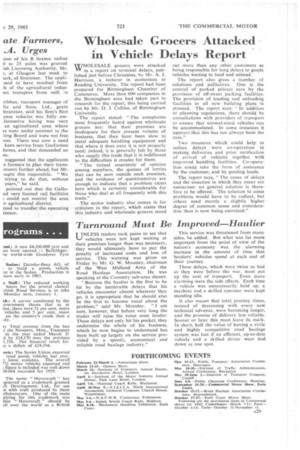Wholesale Grocers Attacked in Vehicle Delays Report
Page 31

If you've noticed an error in this article please click here to report it so we can fix it.
WHOLESALE grocers were attacked YV in a report on terminal delays, published just before Christmas, by Mr. A. J. Harrison, a lecturer in economics at Reading University. The report had been prepared for Birmingham Chamber of Commerce. More than 600 companies in the Birmingham area had taken part in research for the report, this being carried out by Mr. D. J. Collins, of Birmingham University.
The report stated: "The complaints most frequently heard against wholesale grocers are: that their premises are inadequate for their present volume of business, that they have been slow to instal adequate handling equipment and that where it does exist it is not properly used; indeed, it is generally felt by those who supply this trade that it is indifferent to the difficulties it creates for them.
"The virtual unanimity of opinion among suppliers, the queues of lorries that can be seen outside such premises, and the evidence of questionnaires are enough to indicate that a problem exists here which is certainly considerable for those who deal at all frequently with this trade."
The motor industry also comes in for criticism in the report, which states that this industry and wholesale grocers stood out more than any other customers as being responsible for long delays to goods vehicles waiting to load and unload.
The report also gives a number of solutions and palliatives. One is the control of parked private cars by the provision of off-street parking facilities. The provision of loading and unloading facilities in all new building plans is stressed. The report says: "In addition to planning regulations, there should be consultations with providers of transport to ensure that normal-sized vehicles can be accommodated. In some instanCes it appears that this has not always been the case."
Two measures which could help to reduce delays were co-operation in making deliveries and prior notification of arrival of vehicles together with improved handling facilities. Co-operation could take the 'form of assistance by the customer, and by pooling loads.
The report says, "The cause of delays and the situation in which they occur are numerous: no general solution is therefore to be offered. The solution to some problems would have to be radical, but others need merely a slightly higher degree of common sense and consideration than is now being exercised."




























































































